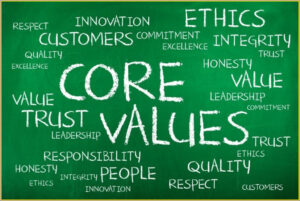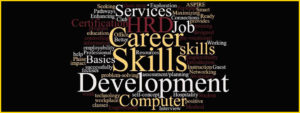We enjoy discovering new ways of thinking and new ways of helping you achieve your goals. From time to time, we will be posting not only our own thoughts but also compelling research and articles by the best authorities in the field.
Seventeen Gorman Principal Jeffrey Leventry on “Providing Constructive Feedback – A Critical Component in the Manager’s Toolkit”:
This article explores the value of providing constructive feedback, which is one of the primary responsibilities of Managers. It articulates the best practices for providing constructive feedback to employees in order to achieve the most return on the Manager’s investment. It also explains the positive impact that this critical Manager skill yields for both employees and their organizations. The article concludes with a challenge – what is stopping you from taking steps to improve this important Manager skill?
To view the article, click here.
Seventeen Gorman Principal Jeffrey Leventry on “Advice for Unlocking Your Hidden Potential”:
This article discusses the two-step process for discovering and unlocking the hidden potential that all of us have, and which is waiting to be tapped. First, it explains how we develop skills that are in demand, and then it offers advice for positioning ourselves to take advantage of opportunity. Finally, it articulates the success factors possessed by those who ultimately unlock their potential to achieve success at work, and in life. The article concludes with a challenge – what is preventing you from starting this process so you can unlock your hidden potential on your road to success?
To view the article, click here.
Seventeen Gorman Principal Jeffrey Leventry on “Why do Leaders often make Poor Strategic Decisions?”:
This article explores the reasons why business Leaders often make poor strategic decisions. It articulates 5 principal reasons (AKA decision traps) that Leaders fall prey to when considering critical decisions at their firms. It then offers 5 techniques that can be employed to overcome the impediments to good decision-making. Finally, it explains 4 primary organizational consequences of poor decision-making, including their impact on employees and other key stakeholders. The article concludes with a challenge – what is preventing your organization from making the required changes to ensure that all important corporate decisions are properly analyzed, researched and vetted?
To view the article, click here.
Seventeen Gorman Principal Jeffrey Leventry on “The Manager’s Role in Motivating Performance”:
This article discusses the role the Manager plays in motivating employees to perform at their best. It defines what we mean by the term “employee motivation” and explains approaches that Managers can utilize to encourage performance in the workplace. It then offers 6 critical benefits of cultivating motivated employees who strive to add value in their organizations. It concludes by suggesting that it is up to the Manager to decide which approaches will be most effective to accomplish individual and Team goals at the firm.
To view the article, click here.
Seventeen Gorman Principal Jeffrey Leventry on “The Real Value of Job Rotation Programs”:
This article explains the real value of Job Rotation Programs that are used by numerous Fortune 500 companies to accelerate career growth for their high potential employees. It starts by articulating the Society for Human Resource Management (SHRM) definition of the concept, and then highlights why these programs serve both management and the employees at the firm. It offers 6 important benefits of Job Rotation Programs, and recommends the best practices for creating such programs in order to reap the individual and organizational benefits that accrue when companies implement these programs as part of their professional development strategy.
To view the article, click here.
Seventeen Gorman Principal Jeffrey Leventry on “The Value of Encouraging Constructive Disagreement”:
This article discusses an approach that is used by the most admired organizational leaders that invites feedback, healthy debate and disagreement to develop optimal solutions and decisions. It then defines what is meant by constructive disagreement and offers 6 ways that this technique can be fostered and implemented by business leaders and managers. In addition, it describes the benefits that result from utilizing this tool, while building and sustaining a culture that values diversity of thought and perspectives. The article ends with a challenge – what actions can you take to change the existing culture so your organization can reap the benefits of encouraging constructive disagreement?
To view the article, click here.
Seventeen Gorman Principal Jeffrey Leventry on “Advice for Building a Civilized Workplace”:
This article provides a high-level summary of a book entitled “The No Asshole Rule – Building a Civilized Workplace and Surviving One That Isn’t” by Stanford University Management Professor Robert I. Sutton. In his book, Professor Sutton gives readers two tests for spotting whether a person is acting like an asshole, and provides 5 factors for measuring the total cost of assholes (TCA) in your organization. He furthers articulates the top 10 steps for enforcing the “No Asshole Rule” in an organization. The article concludes by stating the tangible benefits that accrue when a firm weeds out the bullies and jerks, as they attempt to build more civilized and respectful workplaces where employee performance can thrive, and where employees desire to learn, grow and make valued contributions in collaboration with their colleagues.
To view the article, click here.
Seventeen Gorman Principal Jeffrey Leventry on “Is Ethical Conduct Encouraged in Your Organization?”:
This article explores the risks of unethical conduct in today’s business environment and showcases the real value of developing ethical cultures in the best-run organizations. After defining what is meant by ethical conduct, the article offers tangible approaches for developing an ethical corporate culture. The article concludes with a challenge – what can you do to change the status quo so your company becomes an ethical leader in your industry and community?
To view the article, click here.
Seventeen Gorman Principal Jeffrey Leventry on “What Acts of Kindness Will You Perform in 2022?”:
This article highlights what a local church did during 2021 to make a positive difference in their local community. It then suggests things that all of us can do in the coming year to assist those who are poor, destitute or lonely so they can improve their lives. The benefits that flow from our acts of kindness are enumerated to demonstrate the real impact we can have on those in need. The article ends with a challenge – what will you do in 2022 to make a positive difference in the lives of those who need our help and support?
To view the article, click here.
Seventeen Gorman Principal Jeffrey Leventry on “Advice for Achieving Success from a Future Hall of Fame Coach”:
This article discusses advice that a Hall of Fame football player received from his coach many years ago – “Do your job better than anyone else and surround yourself with good people.” It then offers a definition for each aspect of this sage advice and provides guidance on how you can apply this advice to achieve your own success, in business and in life. The article concludes with a challenge – what steps will you take today to do your job better than anyone else and surround yourself with good people who will fuel your ultimate success?
To view the article, click here.
Seventeen Gorman Principal Jeffrey Leventry on “The Pitfalls of Using Coercion as Your Primary Approach for Influencing & Motivating Your Team”:
This article explains the use of coercion (the ability to punish or recommend punishment) as an approach for influencing and motivating a Manager’s team. It defines the three types of hard power – Coercion, Legitimate Power and Reward – and offers examples of how coercion is used by Managers to achieve desired results. In addition, it articulates several ways that an over-reliance on coercion harms employees and the organization. The article concludes with a challenge – what steps will you take to limit the use of coercion and focus instead on implementing soft power approaches for influencing and motivating the employees in your organization?
To view the article, click here.
Seventeen Gorman Principal Jeffrey Leventry on “Employing Soft Power as Part of Your Management Toolkit”:
This article discusses the importance of using soft power as a Manager in order to influence and motivate others to achieve desired outcomes. It defines the two types of soft power – Referent Power and Expert Power – and explains their ability to affect long-term changes in attitudes and behavior. The article offers several ways that Managers can develop soft power over time so it can become part of the Manager’s toolkit. In addition, the benefits of using soft power effectively are highlighted, including the impact on the Manager’s reputation as well as the organization. The article concludes with a challenge – what steps will you take to develop your soft power and make it an important component of your Management toolkit?
To view the article, click here.
Seventeen Gorman Principal Jeffrey Leventry on “A Model for Overcoming the Four Villains of Decision Making”:
This article describes a model for overcoming the 4 villains of decision making that hinder our ability to making good decisions that produce optimal outcomes. Each of the 4 villains (Narrow Framing, Confirmation Bias, Short-term Emotion and Overconfidence) are defined and then the “WRAP” Decision Model (developed by Chip and Dan Heath) is articulated. This is followed by a brief discussion of tools that can help us accomplish each of the 4 steps in the decision model. Finally, guidance notes are provided to help users of the model understand how this simple model can be applied to any important decision that may be faced in business and non-business situations.
To view the article, click here.
Seventeen Gorman Principal Jeffrey Leventry on “The Power of Resilience”:
This article examines the need to be resilient in 2021 based upon the challenges all of us faced during 2020. Resilience is defined and discussed as a skill that can be learned and honed over time by confronting and overcoming life obstacles and setbacks. The article offers 7 approaches for becoming more resilient in the coming year and recommends combining them with a positive mindset and a proactive approach that increases the likelihood of success. Several examples of what resilience can do for each of us are provided as important benefits that are derived from improved resilience. The article concludes with a challenge that asks – what will you do to recover from any misfortune that has befallen you over the past year and who can you partner with to prosper in the coming year?
To view the article, click here.
Seventeen Gorman Principal Jeffrey Leventry on “The Power of Collaboration”:
This article explores the powerful impact that collaboration can make in the business world, and in life. After defining what is meant by collaboration, the article explains the ingredients that are necessary to create an atmosphere where people feel safe to partner with one another to innovate new ideas or products. The true value of collaboration is then highlighted with 5 examples of how genuine collaboration can benefit an organization. The article concludes with a challenge that asks when each of us will partner with someone to create the next innovative idea or product that will help
shape the world we live in.
To view the article, click here.
Seventeen Gorman Principal Jeffrey Leventry on “Will COVID-19 Fuel the Next Wave of Innovation”:
This article begins by articulating the Vanishing Options Test for decision making, and compares this approach with how people and organizations are tapping into their creative mindset to invent approaches for adapting to our new environment in light of COVID-19. The article provides many examples of how we are improvising as we rethink how we shop, travel, work, communicate and interact with one another. In addition, the article outlines both the short-term and long-term implications for this wave of innovation. The article concludes by asking what breakthrough ideas each of us will devise to make a positive difference in the way we respond to our “new normal”.
To view the article, click here.
Seventeen Gorman Principal Jeffrey Leventry on “Is There a Silver Lining to the Coronavirus Pandemic?”:
This article discusses the new behaviors / change in behaviors that have resulted from the Coronavirus Pandemic. After listing many ways that people have altered their behavior in light of the pandemic, the article offers numerous examples of how people are exhibiting their new behaviors in positive ways. The motivation that underlies the positive behavior change is explored and 5 reasons are suggested for why people have risen to the challenges that face all of us. The article concludes with a call to action that asks each of us to make the best behaviors part of our identity in the “new normal” environment.
To view the article, click here.
Seventeen Gorman Principal Jeffrey Leventry on “Everyday Leadership”:
This article discusses the concept of “Everyday Leadership” espoused by Drew Dudley, a Leadership Development Consultant. He believes that each of us has the potential to be a Leader, regardless of our role or position. He also calls on us to celebrate Leadership as an everyday act of improving each other’s lives. The article raises the question – how will we know if something we have done to help someone has made a positive difference in their lives? The article concludes by challenging readers to take action to let someone know how much you appreciate what they have done for you, regardless of how insignificant it may have been.
To view the article, click here.
Seventeen Gorman Principal Jeffrey Leventry on “Bullying in the Workplace is Inappropriate, Counterproductive and Simply Wrong!”:
This article discusses the pervasive practice of bullying behavior in the workplace, defines what is meant by bullying and provides common examples of this type of aberrant behavior in corporate America. It also explains the motivation and reasons why people utilize bullying tactics in the workplace to achieve their objectives. In addition, it articulates what the best firms do to reduce or eliminate this behavior from the corporate culture.
The article concludes by challenging readers to take action steps to create a more civil, positive, safe environment that respects the dignity of all employees.
To view the article, click here.
Seventeen Gorman Principal Jeffrey Leventry on “The Value of Perservance”:
This article discusses the value of perseverance in today’s business climate and defines what is meant by the term perseverance. It offers examples of people who overcame obstacles and hurdles before they finally achieved success. It also provides 6 approaches for mastering the character trait of perseverance to accomplish goals and objectives. Finally, it concludes by articulating 5 discernible benefits of being persistent and raises the question – what is stopping you from persevering to achieve your goals?
To view the article, click here.
Seventeen Gorman Principal Jeffrey Leventry on “Do You Have an Effective Career Plan?”:
This article addresses the very real issue of career transition and how today’s professionals can prepare for it long before it happens. First, it offers a 5-step process for creating a Career Plan that is practical and can be tailored to your needs and interests. Next, it suggests three tangible benefits of having an effective Career Plan that can guide you along your career path. Finally, the article argues that the plan should be a companion to your ongoing personal growth and development, as you mature, acquire new skills, and advance in your career.
To view the article, click here.
Seventeen Gorman Principal Jeffrey Leventry on “The Role and Impact of Coaching in Business”:

This article explores the role and impact of coaching in the context of business. First, it defines what is meant by business coaching and then it explains why creating a coaching culture is important for today’s firms. It also offers some effective ways to instill a coaching culture in an organization so that employees recognize its value and are eager to participate in the coaching process. This article concludes by highlighting the impact that effective coaching can have on organizations who adopt coaching best practices.
To view the article, click here.
Seventeen Gorman Principal Jeffrey Leventry on “The Value of Organizational Trust”:

This article discusses the values of loyalty and trust in today’s business environment and defines what is meant by each concept. While loyalty is important, the article argues that trust is more important in developing relationships that count most in organizations, and which lead to business success. It also articulates ways that trust can be built, while enhancing loyalty throughout the organization. The article concludes by identifying the tangible benefits that result from developing organizational trust.
To view the article, click here.
Seventeen Gorman Principal Jeffrey Leventry on “The Recipe for Achieving Success”:

This article provides my advice for achieving success in life and in one’s chosen profession. It articulates 6 principles that should guide your thinking and actions every day, regardless of the situation you may be presented with. It further recommends that this approach should become part of your DNA as you develop a success mindset and build confidence in your skills and abilities. The article concludes by indicating that it is important to celebrate each and every accomplishment to reward yourself for attaining your goal.
To view the article, click here.
Seventeen Gorman Principal Jeffrey Leventry on “Are You Championing the Women in Your Organization?”:

This article articulates the nature of the issue of gender equality in the workplace and provides approaches for remedying the situation in the business world. It also explains some of the ways that businesses benefit from having women in leadership positions. The article concludes by indicating that while some progress has been made on this important issue, much more work needs to be done to achieve equal opportunity for women, and raises the question – what is preventing you from doing your part to advance the ball on this issue?
To view the article, click here.
Seventeen Gorman Principal Jeffrey Leventry on “Are You a Servant Leader?”:

This article explains the concept of a Servant Leader and provides the qualities that define this leadership concept. It also offers some examples of Servant Leaders in the business world and suggests ideas for developing Servant Leaders in your organization. The article concludes by articulating the short-term and long-term benefits of this leadership approach, and raises the question – what is stopping you from becoming a Servant Leader?
To view the article, click here.
Seventeen Gorman Principal Jeffrey Leventry on “Do You Have the Right Attitude?”:
This article discusses the value of the character trait called “attitude”. It explains what the right (defined as positive) attitude is and provides examples of people who possess this trait and have used it to achieve immense success. It also offers an explanation for how you get it and how beneficial it can be in the workplace as you pursue success in your career.
To view the article, click here.
Seventeen Gorman Principal Jeffrey Leventry on “My Favorite Suberboss”:
This article explores a new managerial concept called the Superboss, which was created by Dartmouth Professor Sydney Finkelstein in his book entitled “Superbosses — How Exceptional Leaders Master the Flow of Talent”. It also defines the concept by articulating the 5 characteristics they possess, gives examples of some popular Superbosses and explains how they are different from normal bosses. This article concludes by applying the key Superboss qualities to a business executive I have known for over 25 years. She is my favorite Superboss and also happens to be my wife.
To view the article, click here.
Seventeen Gorman Principal Jeffrey Leventry on “The Critical Traits of Admired Leaders”:
This article highlights 4 critical traits of admired leaders and explains why they are so important to effective leadership. It compares and contrasts D.A. Benton’s views in her book “CEO Material – How to be a Leader in any Organization” with my personal experiences as an organizational leader. In the final analysis, great leaders are a key ingredient of long-term organizational success.
To view the article, click here.
Seventeen Gorman Principal Jeffrey Leventry on “The 4 R’s of Good Management”:
This article offers insight into manager best practices in today’s business environment that breed top-notch team performance and lead to optimal results. The principles of good management that are outlined in the article are referred to as the 4 R’s and include: Respect, Responsibility, Reward and Recognition. Managers who adopt this approach are admired by their staff (as well as their organization) and position themselves for long-term career success.
To view the article, click here.
Seventeen Gorman Principal Jeffrey Leventry on “The Recipe for Overcoming Adversity”:
This article addresses the issue of overcoming adversity, which is a normal part of our daily, weekly or monthly existence. It provides readers with a 4-step approach that enables them to overcome the hurdles and impediments that often prevent them from achieving success in business and in life. The advice contained in the article routinely yields great success – especially when we are committed to achieving our end goal.
To view the article, click here.
Seventeen Gorman Principal Jeffrey Leventry on “Do You Have Likeability?”:
This article explores the special character trait called “likeability”. It explains what it is and provides examples of people who possess this trait and have used it to achieve success. It also offers advice for how you get it and how it can be used in the workplace to influence others as you pursue success in your chosen profession.
To view the article, click here.
Seventeen Gorman Principal Jeffrey Leventry on “Tuning Up Your Game for Career Advancement”:
This article focuses on the short-term and long-term approach employees should consider for Career Advancement. I have advised many employees who desire to advance in their career and have seen the positive results that can be achieved when using this two-pronged approach. My role in this process is to guide employees and Managers in the creation of short-term and long-term plans that target assessed needs so that objectives can be achieved with maximum results. I can also help devise effective ways to gauge progress toward attaining both short-term and long-term goals as the employee’s career unfolds.
To view the article, click here.
Seventeen Gorman Principal Jeffrey Leventry on The Cure for “Flying Under The Radar” Syndrome:
This article deals with a common problem in organizations – employees who withdraw from the Team. When this occurs the consequences are detrimental to the individual, the Team, as well as the firm. While many approaches exist to address this organizational challenge, often times Team Building can be utilized to improve working relationships and remedy the “flying under the radar” syndrome.
To view the article, click here.
Seventeen Gorman Principal Jeffrey Leventry on “Seeking Clarity Through Coaching”:

This article articulates the approach that I utilize to coach clients who are having difficulty seeing situations clearly because of the obstacles that stand in their way. I use an “Inside Out” (InsideOut DEVELOPMENT™) approach that taps into the individual’s inherent capacity, increasing their belief in themselves and moving their attention to key performance variables. The bottom line is that when we create the right environment and eliminate interference we optimize the value of the coaching session and are able to develop a plan of action that ensures the coachee’s ultimate success.
To view the article, click here.
In the June 2012 issue of Chief Learning Officer Magazine, Seventeen Gorman Principal Jeffrey Leventry shared his thoughts on building a high-performance team.
“While high-performance teams possess many attributes, there are five ingredients that are essential when developing these teams.
Trust: Trust is the foundation of the high-performance team and the basis upon which the team is built. Team members must respect, support and trust each other in every aspect of their work life as they endeavor to build positive relationships. They need to be honest and feel comfortable providing candid and constructive feedback formally or informally. Continue Reading...





























